PSY202 Assessment: Maria's Cognitive and Psychosocial Development
VerifiedAdded on 2022/09/14
|7
|1590
|12
Report
AI Summary
This report presents an assessment of Maria Jenkins, a two-year-old child, focusing on her cognitive, psychosocial, and behavioral development. The assessment utilizes Piaget's theory of cognitive development to evaluate Maria's perceptual skills and conceptual learning, examining her responses in sensorimotor and preoperational stages. Erikson's theory of psychosocial development is applied to understand Maria's interactions with her parents, particularly the development of trust and autonomy. The report also investigates the influence of Maria's home environment, drawing on social learning theory to analyze the impact of parental care and interaction on her behavior. The findings highlight the importance of parental involvement and a supportive environment, offering recommendations for the parents to foster Maria's healthy development, including equal time and guidance. The report concludes that by implementing these recommendations, Maria's behavioral issues can be addressed, leading to positive changes in her development.
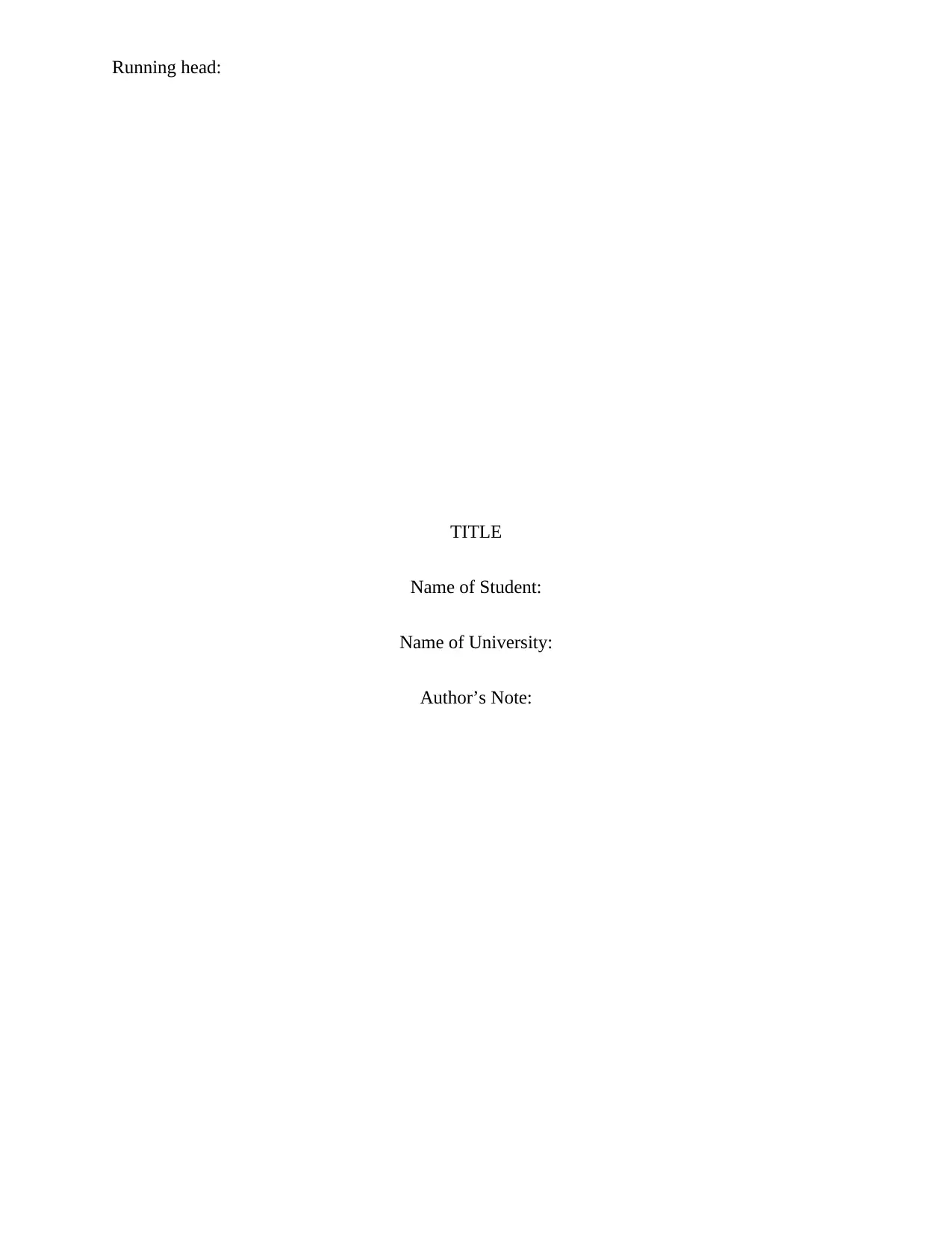
Running head:
TITLE
Name of Student:
Name of University:
Author’s Note:
TITLE
Name of Student:
Name of University:
Author’s Note:
Paraphrase This Document
Need a fresh take? Get an instant paraphrase of this document with our AI Paraphraser
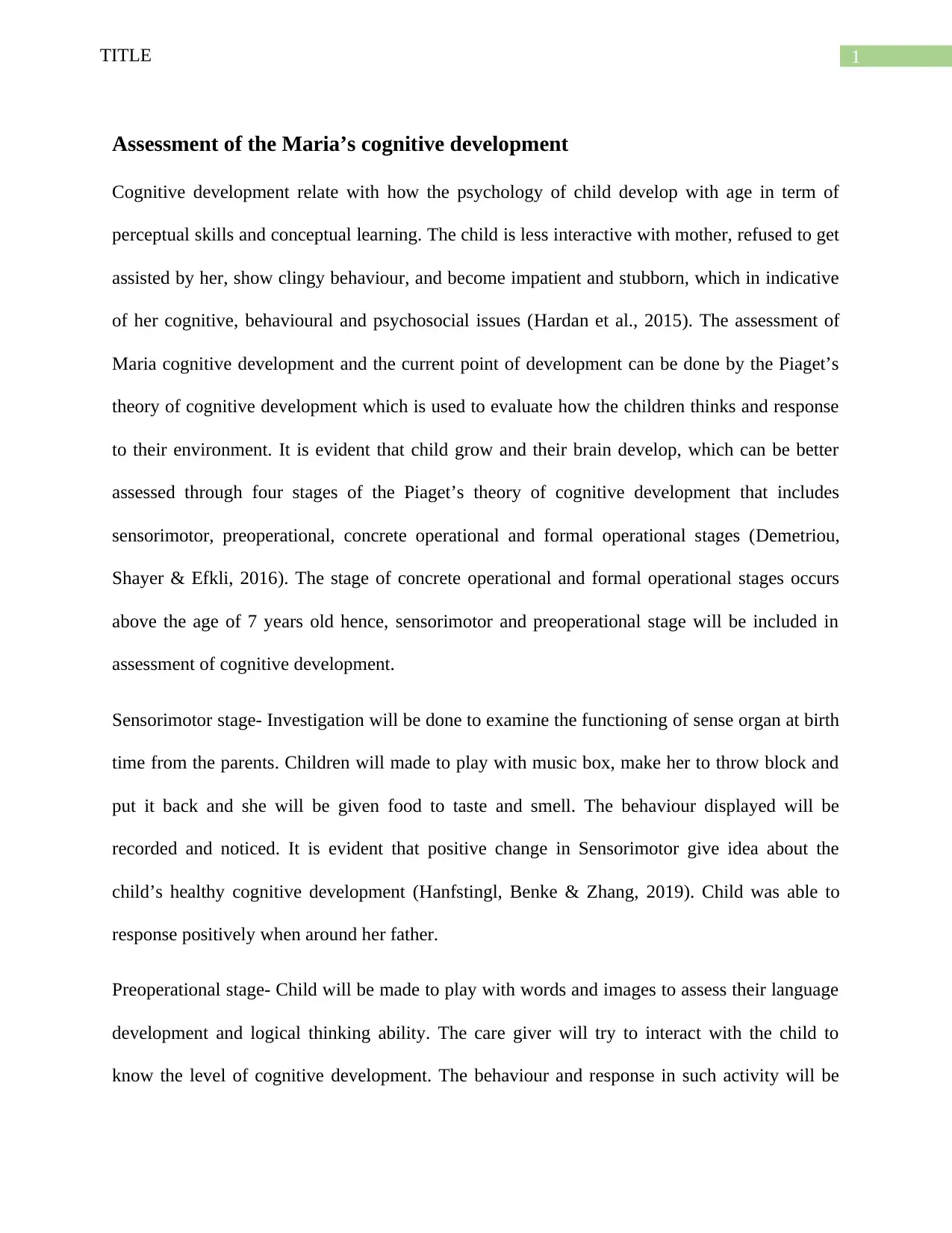
1TITLE
Assessment of the Maria’s cognitive development
Cognitive development relate with how the psychology of child develop with age in term of
perceptual skills and conceptual learning. The child is less interactive with mother, refused to get
assisted by her, show clingy behaviour, and become impatient and stubborn, which in indicative
of her cognitive, behavioural and psychosocial issues (Hardan et al., 2015). The assessment of
Maria cognitive development and the current point of development can be done by the Piaget’s
theory of cognitive development which is used to evaluate how the children thinks and response
to their environment. It is evident that child grow and their brain develop, which can be better
assessed through four stages of the Piaget’s theory of cognitive development that includes
sensorimotor, preoperational, concrete operational and formal operational stages (Demetriou,
Shayer & Efkli, 2016). The stage of concrete operational and formal operational stages occurs
above the age of 7 years old hence, sensorimotor and preoperational stage will be included in
assessment of cognitive development.
Sensorimotor stage- Investigation will be done to examine the functioning of sense organ at birth
time from the parents. Children will made to play with music box, make her to throw block and
put it back and she will be given food to taste and smell. The behaviour displayed will be
recorded and noticed. It is evident that positive change in Sensorimotor give idea about the
child’s healthy cognitive development (Hanfstingl, Benke & Zhang, 2019). Child was able to
response positively when around her father.
Preoperational stage- Child will be made to play with words and images to assess their language
development and logical thinking ability. The care giver will try to interact with the child to
know the level of cognitive development. The behaviour and response in such activity will be
Assessment of the Maria’s cognitive development
Cognitive development relate with how the psychology of child develop with age in term of
perceptual skills and conceptual learning. The child is less interactive with mother, refused to get
assisted by her, show clingy behaviour, and become impatient and stubborn, which in indicative
of her cognitive, behavioural and psychosocial issues (Hardan et al., 2015). The assessment of
Maria cognitive development and the current point of development can be done by the Piaget’s
theory of cognitive development which is used to evaluate how the children thinks and response
to their environment. It is evident that child grow and their brain develop, which can be better
assessed through four stages of the Piaget’s theory of cognitive development that includes
sensorimotor, preoperational, concrete operational and formal operational stages (Demetriou,
Shayer & Efkli, 2016). The stage of concrete operational and formal operational stages occurs
above the age of 7 years old hence, sensorimotor and preoperational stage will be included in
assessment of cognitive development.
Sensorimotor stage- Investigation will be done to examine the functioning of sense organ at birth
time from the parents. Children will made to play with music box, make her to throw block and
put it back and she will be given food to taste and smell. The behaviour displayed will be
recorded and noticed. It is evident that positive change in Sensorimotor give idea about the
child’s healthy cognitive development (Hanfstingl, Benke & Zhang, 2019). Child was able to
response positively when around her father.
Preoperational stage- Child will be made to play with words and images to assess their language
development and logical thinking ability. The care giver will try to interact with the child to
know the level of cognitive development. The behaviour and response in such activity will be
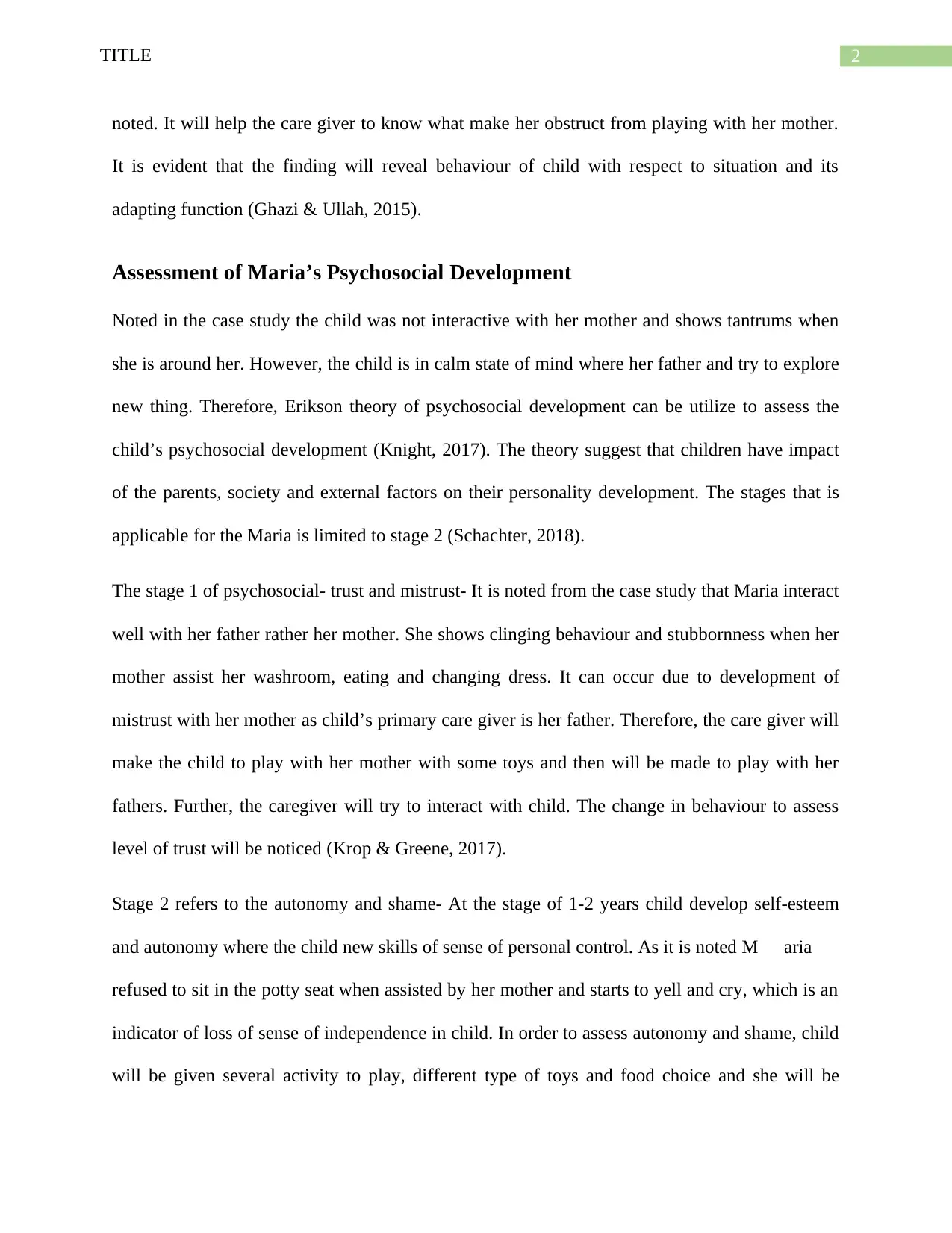
2TITLE
noted. It will help the care giver to know what make her obstruct from playing with her mother.
It is evident that the finding will reveal behaviour of child with respect to situation and its
adapting function (Ghazi & Ullah, 2015).
Assessment of Maria’s Psychosocial Development
Noted in the case study the child was not interactive with her mother and shows tantrums when
she is around her. However, the child is in calm state of mind where her father and try to explore
new thing. Therefore, Erikson theory of psychosocial development can be utilize to assess the
child’s psychosocial development (Knight, 2017). The theory suggest that children have impact
of the parents, society and external factors on their personality development. The stages that is
applicable for the Maria is limited to stage 2 (Schachter, 2018).
The stage 1 of psychosocial- trust and mistrust- It is noted from the case study that Maria interact
well with her father rather her mother. She shows clinging behaviour and stubbornness when her
mother assist her washroom, eating and changing dress. It can occur due to development of
mistrust with her mother as child’s primary care giver is her father. Therefore, the care giver will
make the child to play with her mother with some toys and then will be made to play with her
fathers. Further, the caregiver will try to interact with child. The change in behaviour to assess
level of trust will be noticed (Krop & Greene, 2017).
Stage 2 refers to the autonomy and shame- At the stage of 1-2 years child develop self-esteem
and autonomy where the child new skills of sense of personal control. As it is noted M aria
refused to sit in the potty seat when assisted by her mother and starts to yell and cry, which is an
indicator of loss of sense of independence in child. In order to assess autonomy and shame, child
will be given several activity to play, different type of toys and food choice and she will be
noted. It will help the care giver to know what make her obstruct from playing with her mother.
It is evident that the finding will reveal behaviour of child with respect to situation and its
adapting function (Ghazi & Ullah, 2015).
Assessment of Maria’s Psychosocial Development
Noted in the case study the child was not interactive with her mother and shows tantrums when
she is around her. However, the child is in calm state of mind where her father and try to explore
new thing. Therefore, Erikson theory of psychosocial development can be utilize to assess the
child’s psychosocial development (Knight, 2017). The theory suggest that children have impact
of the parents, society and external factors on their personality development. The stages that is
applicable for the Maria is limited to stage 2 (Schachter, 2018).
The stage 1 of psychosocial- trust and mistrust- It is noted from the case study that Maria interact
well with her father rather her mother. She shows clinging behaviour and stubbornness when her
mother assist her washroom, eating and changing dress. It can occur due to development of
mistrust with her mother as child’s primary care giver is her father. Therefore, the care giver will
make the child to play with her mother with some toys and then will be made to play with her
fathers. Further, the caregiver will try to interact with child. The change in behaviour to assess
level of trust will be noticed (Krop & Greene, 2017).
Stage 2 refers to the autonomy and shame- At the stage of 1-2 years child develop self-esteem
and autonomy where the child new skills of sense of personal control. As it is noted M aria
refused to sit in the potty seat when assisted by her mother and starts to yell and cry, which is an
indicator of loss of sense of independence in child. In order to assess autonomy and shame, child
will be given several activity to play, different type of toys and food choice and she will be
⊘ This is a preview!⊘
Do you want full access?
Subscribe today to unlock all pages.

Trusted by 1+ million students worldwide
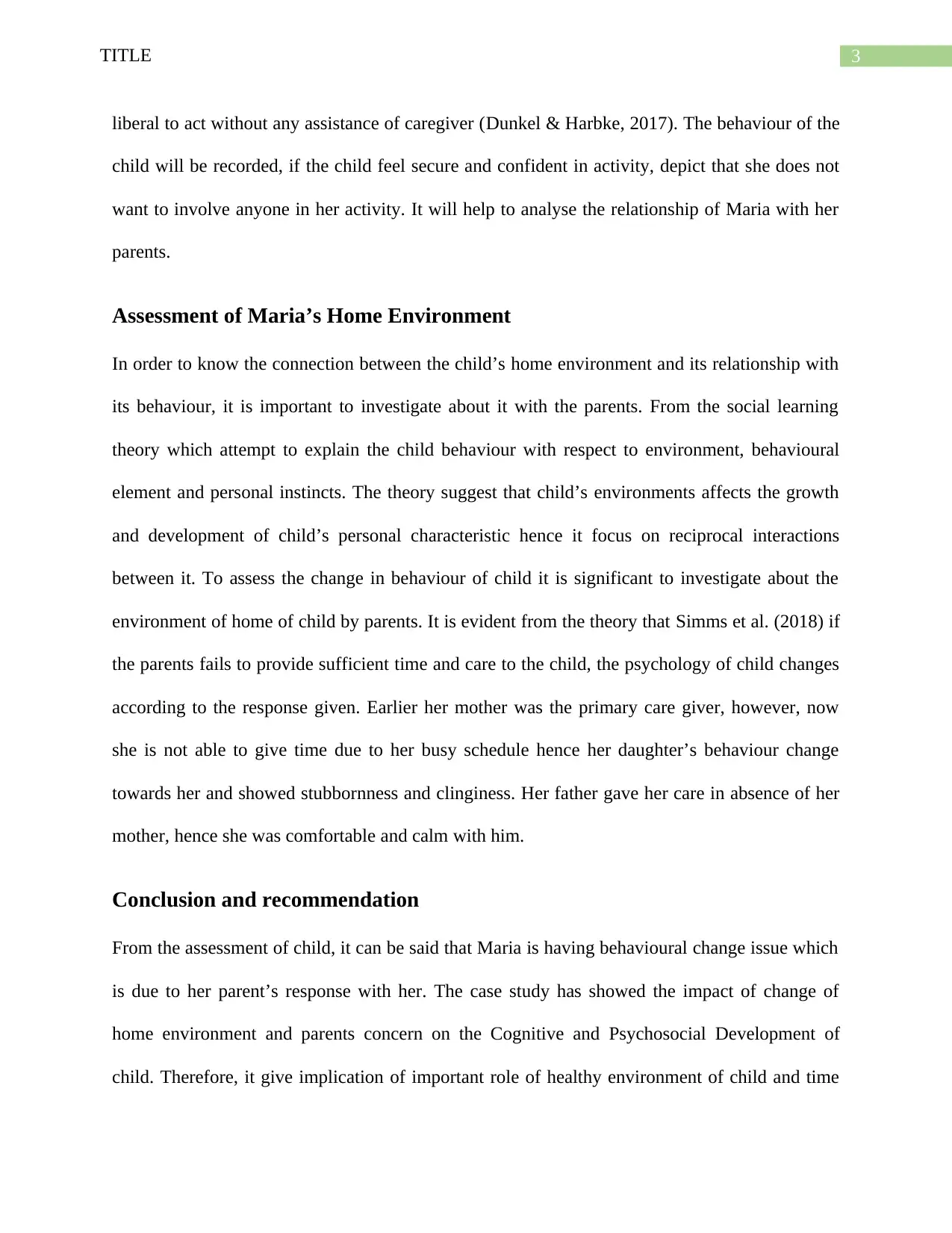
3TITLE
liberal to act without any assistance of caregiver (Dunkel & Harbke, 2017). The behaviour of the
child will be recorded, if the child feel secure and confident in activity, depict that she does not
want to involve anyone in her activity. It will help to analyse the relationship of Maria with her
parents.
Assessment of Maria’s Home Environment
In order to know the connection between the child’s home environment and its relationship with
its behaviour, it is important to investigate about it with the parents. From the social learning
theory which attempt to explain the child behaviour with respect to environment, behavioural
element and personal instincts. The theory suggest that child’s environments affects the growth
and development of child’s personal characteristic hence it focus on reciprocal interactions
between it. To assess the change in behaviour of child it is significant to investigate about the
environment of home of child by parents. It is evident from the theory that Simms et al. (2018) if
the parents fails to provide sufficient time and care to the child, the psychology of child changes
according to the response given. Earlier her mother was the primary care giver, however, now
she is not able to give time due to her busy schedule hence her daughter’s behaviour change
towards her and showed stubbornness and clinginess. Her father gave her care in absence of her
mother, hence she was comfortable and calm with him.
Conclusion and recommendation
From the assessment of child, it can be said that Maria is having behavioural change issue which
is due to her parent’s response with her. The case study has showed the impact of change of
home environment and parents concern on the Cognitive and Psychosocial Development of
child. Therefore, it give implication of important role of healthy environment of child and time
liberal to act without any assistance of caregiver (Dunkel & Harbke, 2017). The behaviour of the
child will be recorded, if the child feel secure and confident in activity, depict that she does not
want to involve anyone in her activity. It will help to analyse the relationship of Maria with her
parents.
Assessment of Maria’s Home Environment
In order to know the connection between the child’s home environment and its relationship with
its behaviour, it is important to investigate about it with the parents. From the social learning
theory which attempt to explain the child behaviour with respect to environment, behavioural
element and personal instincts. The theory suggest that child’s environments affects the growth
and development of child’s personal characteristic hence it focus on reciprocal interactions
between it. To assess the change in behaviour of child it is significant to investigate about the
environment of home of child by parents. It is evident from the theory that Simms et al. (2018) if
the parents fails to provide sufficient time and care to the child, the psychology of child changes
according to the response given. Earlier her mother was the primary care giver, however, now
she is not able to give time due to her busy schedule hence her daughter’s behaviour change
towards her and showed stubbornness and clinginess. Her father gave her care in absence of her
mother, hence she was comfortable and calm with him.
Conclusion and recommendation
From the assessment of child, it can be said that Maria is having behavioural change issue which
is due to her parent’s response with her. The case study has showed the impact of change of
home environment and parents concern on the Cognitive and Psychosocial Development of
child. Therefore, it give implication of important role of healthy environment of child and time
Paraphrase This Document
Need a fresh take? Get an instant paraphrase of this document with our AI Paraphraser
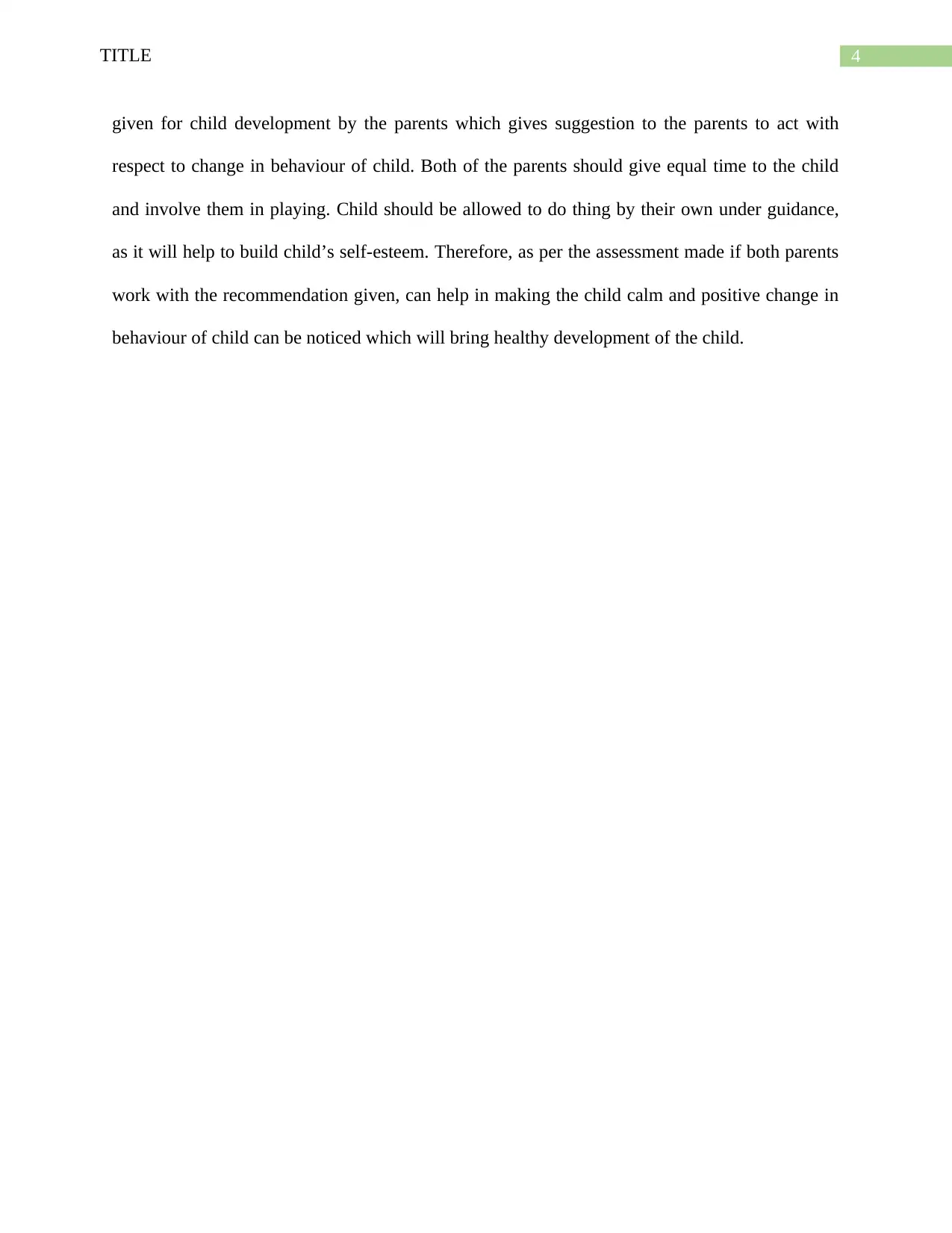
4TITLE
given for child development by the parents which gives suggestion to the parents to act with
respect to change in behaviour of child. Both of the parents should give equal time to the child
and involve them in playing. Child should be allowed to do thing by their own under guidance,
as it will help to build child’s self-esteem. Therefore, as per the assessment made if both parents
work with the recommendation given, can help in making the child calm and positive change in
behaviour of child can be noticed which will bring healthy development of the child.
given for child development by the parents which gives suggestion to the parents to act with
respect to change in behaviour of child. Both of the parents should give equal time to the child
and involve them in playing. Child should be allowed to do thing by their own under guidance,
as it will help to build child’s self-esteem. Therefore, as per the assessment made if both parents
work with the recommendation given, can help in making the child calm and positive change in
behaviour of child can be noticed which will bring healthy development of the child.
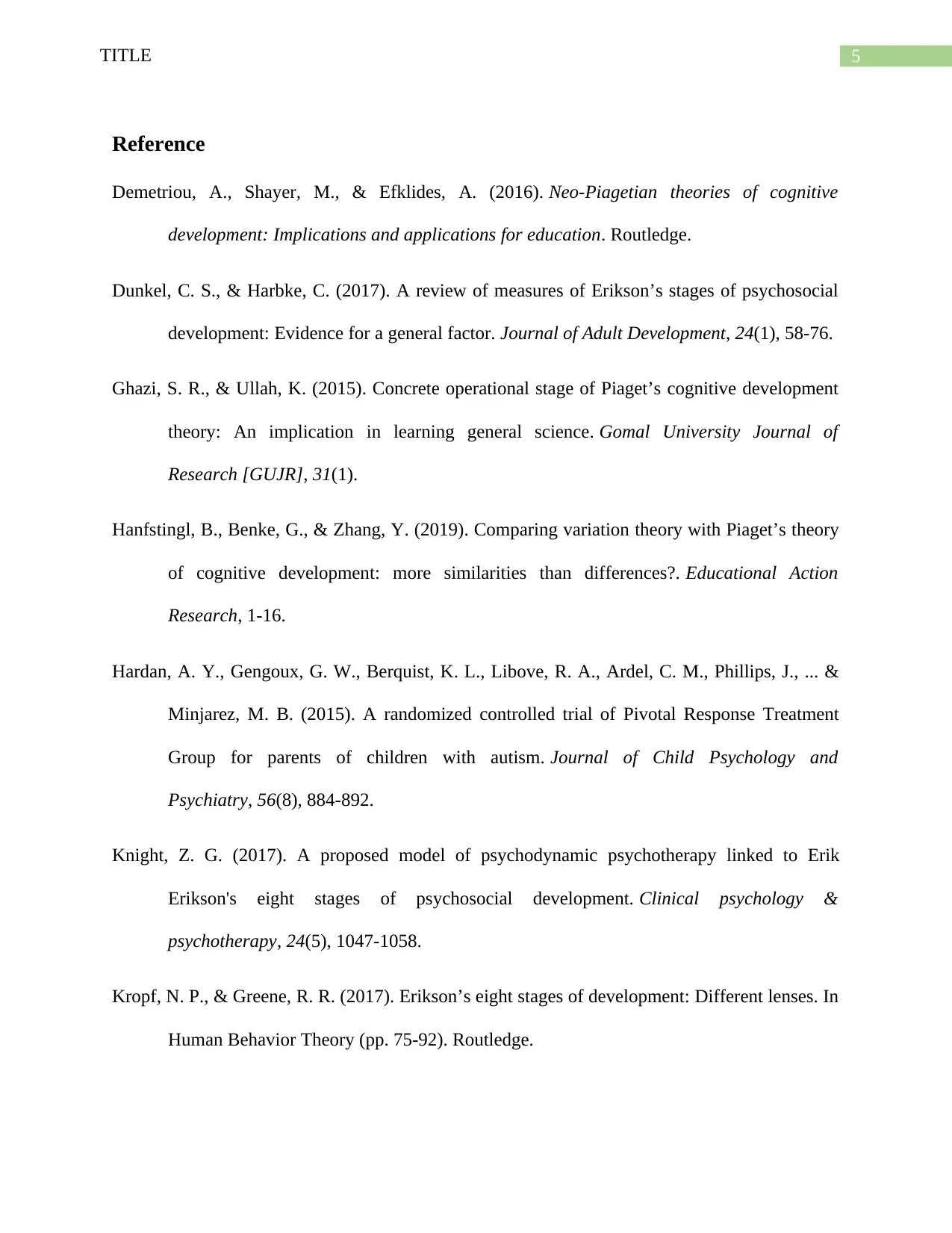
5TITLE
Reference
Demetriou, A., Shayer, M., & Efklides, A. (2016). Neo-Piagetian theories of cognitive
development: Implications and applications for education. Routledge.
Dunkel, C. S., & Harbke, C. (2017). A review of measures of Erikson’s stages of psychosocial
development: Evidence for a general factor. Journal of Adult Development, 24(1), 58-76.
Ghazi, S. R., & Ullah, K. (2015). Concrete operational stage of Piaget’s cognitive development
theory: An implication in learning general science. Gomal University Journal of
Research [GUJR], 31(1).
Hanfstingl, B., Benke, G., & Zhang, Y. (2019). Comparing variation theory with Piaget’s theory
of cognitive development: more similarities than differences?. Educational Action
Research, 1-16.
Hardan, A. Y., Gengoux, G. W., Berquist, K. L., Libove, R. A., Ardel, C. M., Phillips, J., ... &
Minjarez, M. B. (2015). A randomized controlled trial of Pivotal Response Treatment
Group for parents of children with autism. Journal of Child Psychology and
Psychiatry, 56(8), 884-892.
Knight, Z. G. (2017). A proposed model of psychodynamic psychotherapy linked to Erik
Erikson's eight stages of psychosocial development. Clinical psychology &
psychotherapy, 24(5), 1047-1058.
Kropf, N. P., & Greene, R. R. (2017). Erikson’s eight stages of development: Different lenses. In
Human Behavior Theory (pp. 75-92). Routledge.
Reference
Demetriou, A., Shayer, M., & Efklides, A. (2016). Neo-Piagetian theories of cognitive
development: Implications and applications for education. Routledge.
Dunkel, C. S., & Harbke, C. (2017). A review of measures of Erikson’s stages of psychosocial
development: Evidence for a general factor. Journal of Adult Development, 24(1), 58-76.
Ghazi, S. R., & Ullah, K. (2015). Concrete operational stage of Piaget’s cognitive development
theory: An implication in learning general science. Gomal University Journal of
Research [GUJR], 31(1).
Hanfstingl, B., Benke, G., & Zhang, Y. (2019). Comparing variation theory with Piaget’s theory
of cognitive development: more similarities than differences?. Educational Action
Research, 1-16.
Hardan, A. Y., Gengoux, G. W., Berquist, K. L., Libove, R. A., Ardel, C. M., Phillips, J., ... &
Minjarez, M. B. (2015). A randomized controlled trial of Pivotal Response Treatment
Group for parents of children with autism. Journal of Child Psychology and
Psychiatry, 56(8), 884-892.
Knight, Z. G. (2017). A proposed model of psychodynamic psychotherapy linked to Erik
Erikson's eight stages of psychosocial development. Clinical psychology &
psychotherapy, 24(5), 1047-1058.
Kropf, N. P., & Greene, R. R. (2017). Erikson’s eight stages of development: Different lenses. In
Human Behavior Theory (pp. 75-92). Routledge.
⊘ This is a preview!⊘
Do you want full access?
Subscribe today to unlock all pages.

Trusted by 1+ million students worldwide
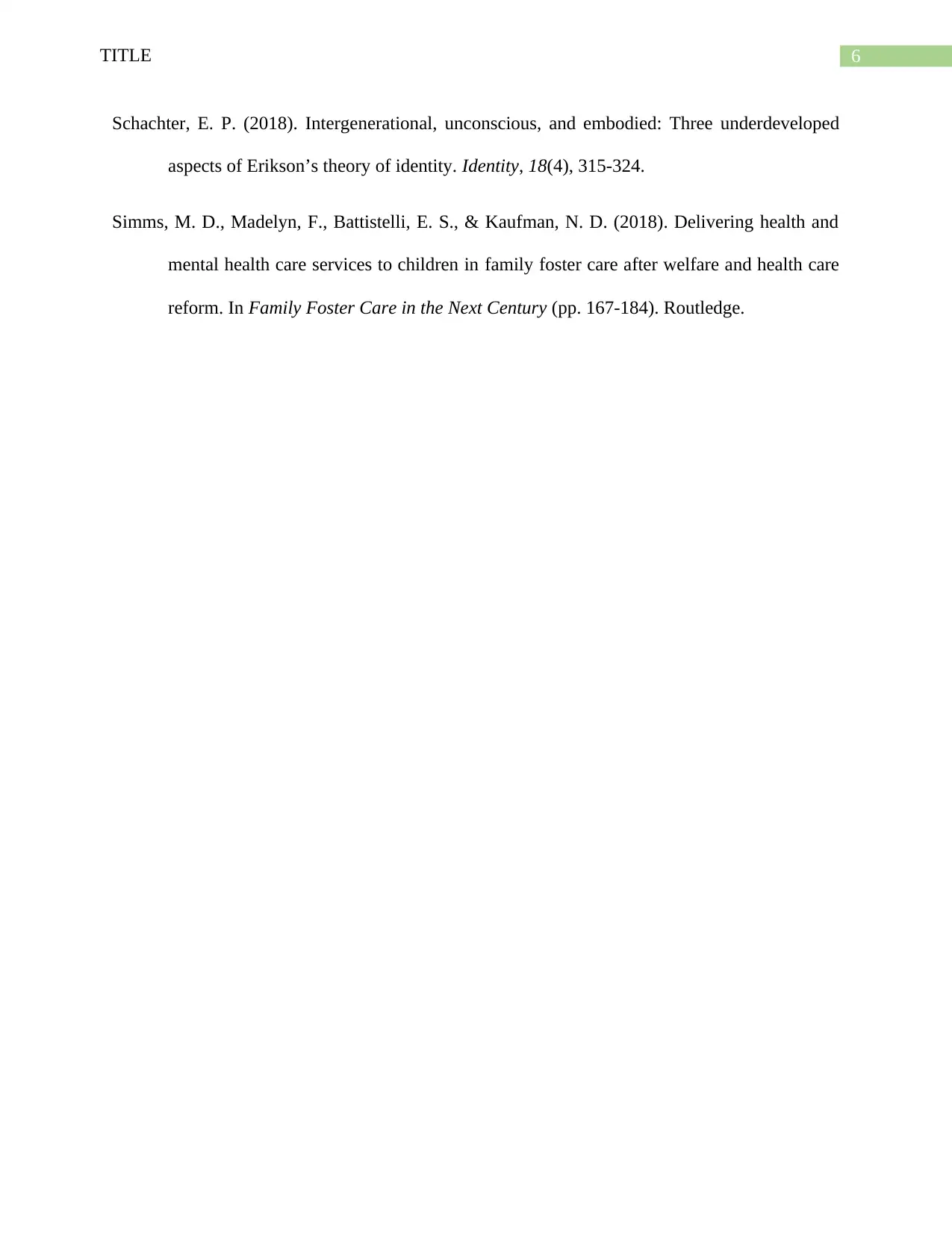
6TITLE
Schachter, E. P. (2018). Intergenerational, unconscious, and embodied: Three underdeveloped
aspects of Erikson’s theory of identity. Identity, 18(4), 315-324.
Simms, M. D., Madelyn, F., Battistelli, E. S., & Kaufman, N. D. (2018). Delivering health and
mental health care services to children in family foster care after welfare and health care
reform. In Family Foster Care in the Next Century (pp. 167-184). Routledge.
Schachter, E. P. (2018). Intergenerational, unconscious, and embodied: Three underdeveloped
aspects of Erikson’s theory of identity. Identity, 18(4), 315-324.
Simms, M. D., Madelyn, F., Battistelli, E. S., & Kaufman, N. D. (2018). Delivering health and
mental health care services to children in family foster care after welfare and health care
reform. In Family Foster Care in the Next Century (pp. 167-184). Routledge.
1 out of 7
Related Documents
Your All-in-One AI-Powered Toolkit for Academic Success.
+13062052269
info@desklib.com
Available 24*7 on WhatsApp / Email
![[object Object]](/_next/static/media/star-bottom.7253800d.svg)
Unlock your academic potential
Copyright © 2020–2026 A2Z Services. All Rights Reserved. Developed and managed by ZUCOL.





